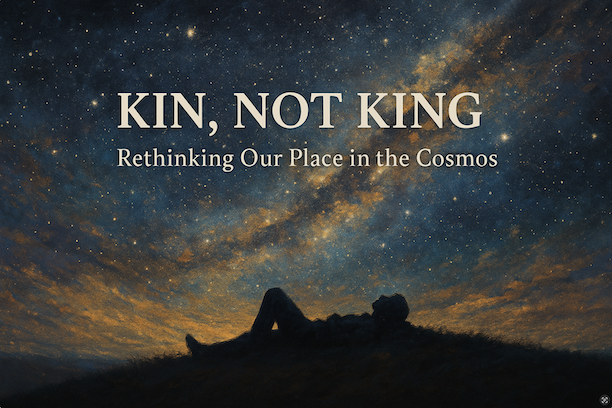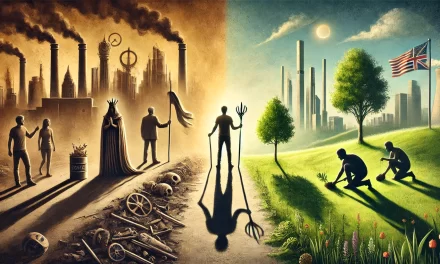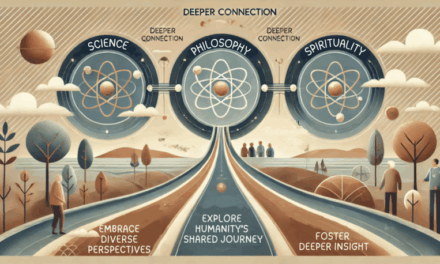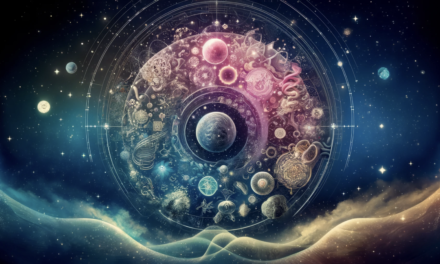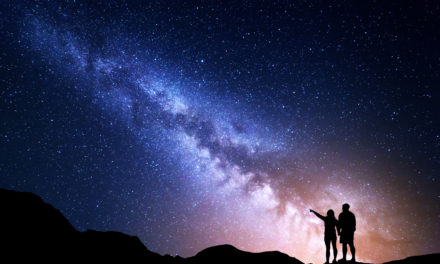What if the great metaphysical debate has never been about purpose versus purposelessness—but about the illusion that we’re the ones who get to decide?
You’re lying on your back beneath a night sky, or maybe just staring into the scrolling glow of your screen. And suddenly—again—the question arises:
Does this all mean something?
Are we here for a reason—or just stardust with wi-fi?
For centuries, Western thought has staged this as a grand debate. On one side: teleology, the belief that the universe has purpose, intention, even a destination. On the other: scientific materialism, the belief that everything is just matter and energy, governed by chance and law, unfolding without meaning or direction.
From Plato to Darwin, from Aquinas to Dawkins, we’ve been asked to pick a side.
But what if this entire setup—the debate, the binary, the choice—was missing the point?
The Sovereignty Problem
Here’s the quiet trick inside both these positions:
Whether we believe the cosmos has purpose or not, we keep placing ourselves at the center—as judges, interpreters, or even arbiters of reality.
When we argue for purpose, we often do it backwards: “Look at the elegance, the order, the design—surely this must have been meant.” But who decides what counts as “meant”? Who benefits when we treat consciousness—especially human consciousness—as the cosmic gold medal?
And when we argue against purpose, we often default to an even more convenient metaphysical narrative: nothing matters. It’s all just atoms and algorithms. Dead matter, no moral claims, no intrinsic value. A perfect framework for endless extraction.
In both versions, we cling to the same position: we get to decide what counts.
We determine what’s real, valuable, purposeful.
We sit, metaphorically, on the cosmic throne.
Materialism: The Most Convenient Lie?
Let’s linger here for a moment.
If the universe is just meaningless stuff, then our entire industrial project—of mining, manipulating, and monetising everything—is not just acceptable, it’s… inevitable. Because there’s no “someone” or “something” to violate. No kin, just resource. No story, just data.
This is the metaphysics of the open pit mine.
And even the spiritualists among us sometimes reinforce this posture. “Everything happens for a reason”—we say—while assuming that reason somehow centres us. Our growth. Our narrative. Our lesson. A cosmic curriculum, tailored for humans.
Whether purpose-filled or meaningless, the story repeats:
Human sovereignty. Human specialness. Human centrality.
What If We’re Kin, Not Kings?
But what if the whole frame is warped?
What if the universe isn’t something to be explained by us—but something we’re inside of, co-shaping, being shaped by, metabolically entangled with?
Let’s start not with judgment, but with relationship.
We are not separate observers of the cosmos—we are expressions of it. The carbon in our bones was birthed in stars. The water in our blood has danced through glaciers, fungi, and fish. Our DNA is an archive of ancient bacterial love stories. Consciousness, in this light, isn’t a human achievement—it’s a cosmic feature, a shared capacity.
We’re not here to figure out the universe.
We are the universe, becoming momentarily reflective, in this particular corner of time and flesh.
So maybe the real question isn’t whether the cosmos has purpose.
Maybe it’s: How do we participate well in the creativity that’s already underway?
A Different Kind of Purpose
Let’s imagine purpose not as a plan, a blueprint, or a cosmic spreadsheet—but as an unfolding dance.
What if evolution isn’t evidence of a puppet master or a blind mechanic, but the natural, wild improvisation of a reality that is itself responsive, creative, alive?
In this view, purpose becomes something we’re entangled with, not something we impose or uncover. Not “God’s plan” or “random chaos,” but a shared becoming. A co-composition.
We’re not meaning-makers looking down on a meaningless world.
We’re meaning-participants in a world that sings back.
The Practice of Humility (Not Smallness)
Now here’s the part that bites.
To live as kin—not kings—means we have to relinquish our default metaphysical throne. And that doesn’t just mean intellectually agreeing with this—it means living differently.
It asks something fierce and tender of us:
Not the false humility of “we’re just accidents,”
Not the arrogance of “we’re the chosen ones,”
But the relational humility of listening, responding, co-shaping with care.
It means shifting from domination to dance.
From consumption to reciprocity.
From extraction to attention.
It’s harder than both theism and atheism, because it doesn’t let us outsource responsibility or meaning. It asks us to co-create purpose, not by declaration, but by participation.
A Tentative Proposal
What if the great metaphysical debate between teleology and materialism is not just limited—it’s a symptom?
A symptom of our addiction to control.
A side effect of our compulsion to know, name, and narrate the universe in ways that reinforce our centrality.
What if the question isn’t “Does the cosmos have meaning?”
But: How do we relate to its unfolding with reverence, responsiveness, and trust?
What if the shift we need isn’t from religion to science, or from dogma to data—but from sovereignty to kinship?
Let’s Leave the Throne Empty
We don’t need to crown ourselves the kings of meaning.
We don’t need to sit in judgment of a cosmos we barely understand.
We can kneel instead.
We can lie down.
We can listen.
We can ask: What does this moment ask of me—not as a sovereign, but as kin?
And maybe—if we’re lucky—the stars, the soil, and the silence will whisper back.
Footnote / Invitation
If these ideas stir something in you, I highly recommend reading Burnout From Humans (free PDF at burnoutfromhumans.net), and companion texts like Hospicing Modernity and Outgrowing Modernity by Vanessa Machado de Oliveira. They’ll deepen this inquiry and offer practices for metabolising the very tensions we’ve danced with here.
Let’s not just rethink the cosmos. Let’s relearn how to belong within it.
Terry Cooke-Davies
12th June 2025

